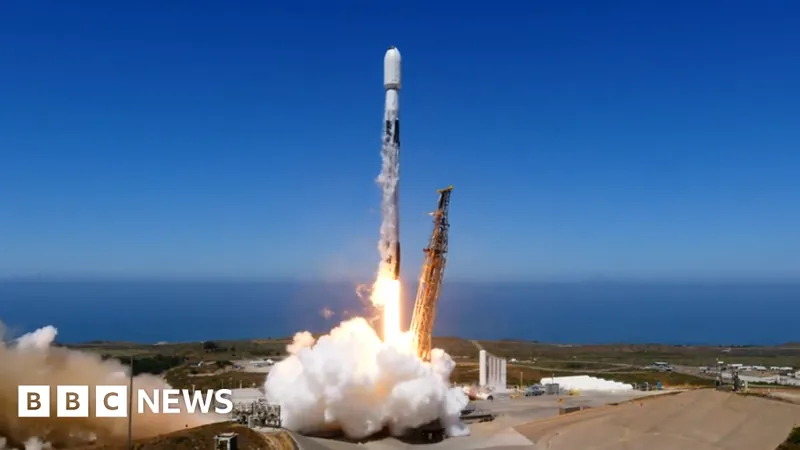
The Rising Tide of African Satellite Launches: A New Era of Technological Sovereignty
2024-10-15
Author: Jia
Introduction
In a monumental milestone for African space exploration, a series of satellites detached one by one from their launch vehicle in a spectacular display of technological advancement. On August 16, 2023, the world witnessed the launch of 116 satellites, among which was Senegal's pioneering CubeSat, GaindeSAT-1A, marking a historic achievement for the nation. This satellite will provide crucial earth observation and telecommunications services, a significant leap towards achieving what Senegal's president referred to as “technological sovereignty.”
The Decreasing Cost of Launches
The decreasing cost of satellite launches has unlocked unprecedented opportunities for smaller nations to engage in space activities, according to Kwaku Sumah, founder of Spacehubs Africa. "This reduction in cost has opened the market up," he asserts. To date, 17 African countries have successfully placed over 60 satellites into orbit, with Senegal, Djibouti, and Zimbabwe making significant strides in operationalizing their satellites in just the last year. This trend is expected to accelerate, with dozens more satellites scheduled for launch in the near future.
Collaboration is Key
Despite these advances, Africa still lacks its own space launch facilities, making collaboration with foreign entities essential for progress. Major global players are keenly engaging with African nations, using partnerships to extend their influence while assisting in the continent's technological growth.
Control over Technology and Data
The drive for African nations to operate their own satellites is underscored by the need for control over technology and immediate access to vital data. Such advancements could enable better monitoring of agricultural conditions, help mitigate the impact of extreme weather events, and enhance telecommunication services in rural areas.
Concerns about the Space Race
However, not everyone views the burgeoning space race positively. Jessie Ndaba, co-founder of Astrofica Technologies in South Africa, describes space endeavors as often perceived as “elite”, with limited engagement in broader society. She emphasizes that the real objective should be addressing pressing issues like climate change, urging a focus on harnessing space technology to monitor vital resources.
The Importance of Satellites
The real importance of satellites is echoed by Sarah Kimani from Kenya's Meteorological Department, who highlights how satellites have proven invaluable in tracking weather conditions that can pose significant risks to her country's populace. The collaboration with Eumetsat has empowered them to improve their forecasting systems significantly, and Kimani advocates for Africa to develop more of its own meteorological satellites to better meet its unique needs.
Dependency on Foreign Expertise
Currently, many African nations rely on foreign expertise and technology to fuel their nascent space programs. This dependency was highlighted by Temidayo Oniosun, managing director of Space in Africa, who pointed out that while sending engineers abroad to learn is beneficial, it often leads to challenges upon their return due to a lack of adequate facilities to support their knowledge.
Collaboration for Development
Senegal's recent satellite was developed by local technicians but was made possible through collaboration with a French university, and launched aboard a SpaceX Falcon 9 rocket, underscoring the importance of international partnerships in achieving such milestones.
Global Recognition and Strategic Importance
International powers like Europe, China, and the U.S. have recognized the strategic importance of African space programs, often blending assistance with political ambitions. While this raises concerns for some observers about unequal influences, there remains optimism about the potential for African nations to negotiate favorable terms in these partnerships.
Future Prospects
Experts believe that the geographical advantages of equatorial launches could position African nations as critical players in future space exploration initiatives. The potential revitalization of facilities like the Luigi Broglio Space Center off the coast of Kenya exemplifies the untapped prospects for developing indigenous space capabilities.
Conclusion
The future of space exploration in Africa appears promising, with nearly 80 satellites in different stages of development. As Mr. Oniosun put it, “I think the future of the industry is very bright.” Africa stands on the brink of a technological revolution that could redefine its place in the global arena. Can this momentum lead to a self-sufficient, empowered African space program that addresses the continent's unique challenges ahead? Only time will tell, but one thing is certain—Africa’s foray into space is just beginning!


 Brasil (PT)
Brasil (PT)
 Canada (EN)
Canada (EN)
 Chile (ES)
Chile (ES)
 España (ES)
España (ES)
 France (FR)
France (FR)
 Hong Kong (EN)
Hong Kong (EN)
 Italia (IT)
Italia (IT)
 日本 (JA)
日本 (JA)
 Magyarország (HU)
Magyarország (HU)
 Norge (NO)
Norge (NO)
 Polska (PL)
Polska (PL)
 Schweiz (DE)
Schweiz (DE)
 Singapore (EN)
Singapore (EN)
 Sverige (SV)
Sverige (SV)
 Suomi (FI)
Suomi (FI)
 Türkiye (TR)
Türkiye (TR)